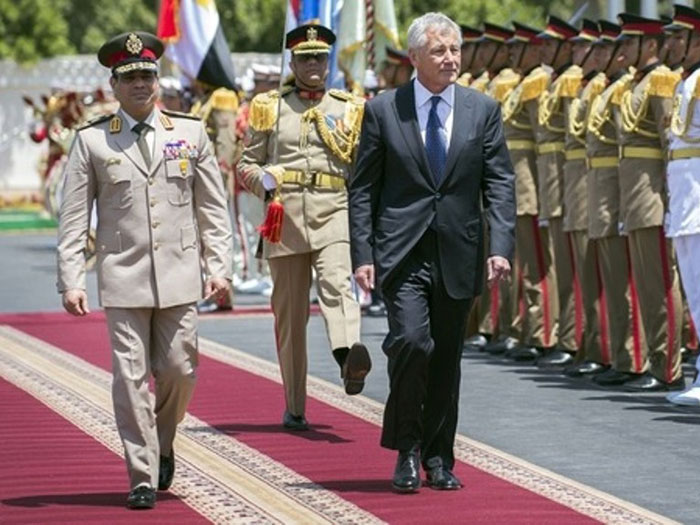U.S. Defense Secretary Chuck Hagel urged caution Wednesday over an Israeli claim Syria's regime used chemical weapons, saying it was “serious business” and any evidence had to be weighed carefully.
Warning against a possible rush to judgment, Hagel indicated he had been caught off guard by allegations from an Israeli General this week that Syria had fired chemical agents against rebels in recent months.
“When I was in Israel they did not give me that assessment. I guess it wasn't complete,” Hagel told reporters in Cairo on a tour of the Middle East that included a three-day visit to Israel.
The United States has warned any use or transfer of chemical weapons would cross a “red line” and possibly trigger military action.
Britain and France also suspect Syria has used chemical weapons but Hagel said U.S. intelligence agencies were still evaluating information and were not yet convinced.
“Suspicions are one thing, evidence is another,” he said.
The Pentagon Chief added that “this is serious business and you want to be as sure as you can be on these kinds of things”.
Asked if U.S. credibility could be at risk as it has repeatedly referred to a “red line,” Hagel said: “I don't think there's any danger”.
The United States cooperates with other spy services but ultimately had to rely “on its own intelligence,” he said before departing for Abu Dhabi.
Hagel's comments marked his first public reaction since the Israeli military's assessment came to light.
Meanwhile, Egyptian President Mohammed Morsi met with Defense Secretary Chuck Hagel in the frame of his visit to Egypt.
The meeting was attended by Defense Minister General Abdel-Fattah el-Sissi and US envoy in Cairo Ann Patterson.
Hagel flew to Abu Dhabi on the Persian Gulf after Egypt. He said his Cairo stop was important for reinforcing U.S. support for the Egyptian government's transition to democracy and its efforts at economic reform.
By including Cairo on his first Mideast tour as Defense Secretary, Hagel was highlighting the Obama administration's hope of preserving influence with the Egyptian military as the country struggles with its transition to democracy.
Egypt was the first Arab country to sign a peace treaty with Israel. The U.S. is deeply concerned, however, that continued instability in Egypt will have broader consequences in a region already rocked by unrest, including in the increasingly lawless Sinai Peninsula.
Source: AFP; AP - Photo: AFP






















